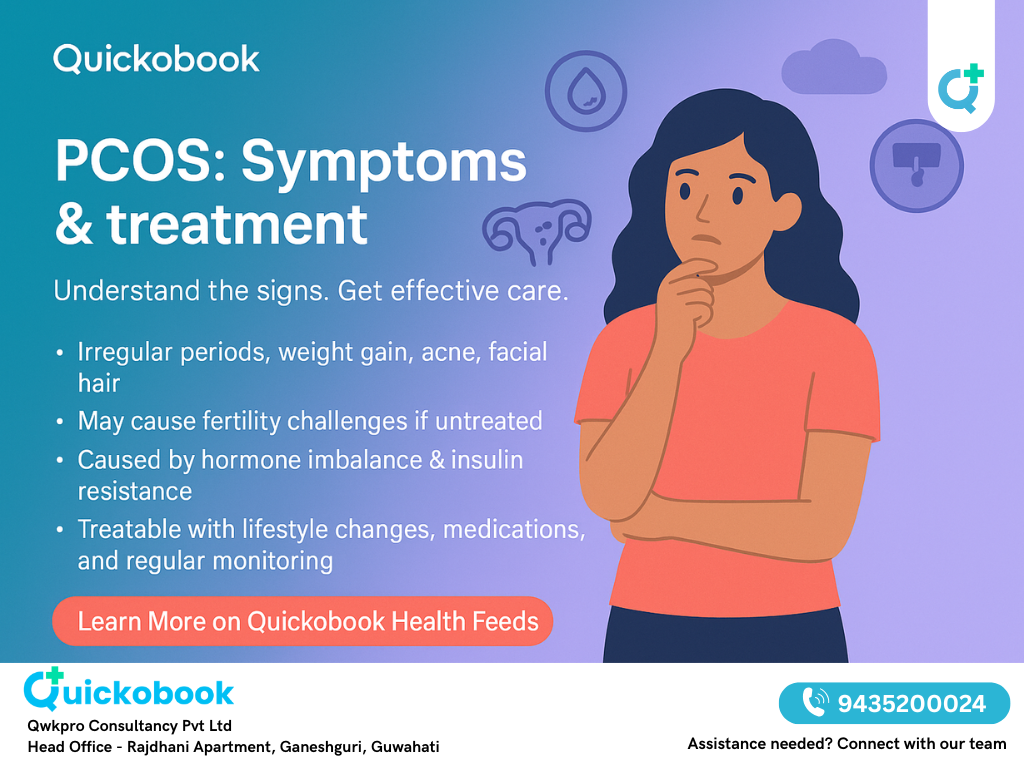Introduction
Polycystic Ovary Syndrome (PCOS) is one of the most common hormonal disorders among women of reproductive age in India. It affects periods, fertility, weight, and overall health. Many women struggle with symptoms without realizing they may have PCOS. Early diagnosis and timely treatment with the help of a gynaecologist can reduce long-term health risks. Platforms like Quickobook make it easier to find expert doctors near you.
What is PCOS?
PCOS (Polycystic Ovary Syndrome) is a hormonal imbalance that affects how the ovaries work. Women with PCOS may have:
- Irregular or absent periods
- Excess male hormones (androgens)
- Multiple small ovarian cysts visible on ultrasound
It is not just a reproductive issue but also linked to insulin resistance, weight gain, and risk of diabetes.
Causes of PCOS
The exact cause of PCOS is unknown, but key factors include:
- Hormonal imbalance – High levels of androgens disrupt ovulation.
- Insulin resistance – Leads to weight gain and increased androgen production.
- Genetics – Family history increases risk.
- Lifestyle factors – Poor diet, lack of exercise, and stress worsen symptoms.
Symptoms of PCOS
Common symptoms include:
- Irregular or missed periods
- Difficulty conceiving (infertility)
- Excess facial and body hair (hirsutism)
- Acne and oily skin
- Weight gain, especially around the waist
- Hair thinning or hair loss on scalp
- Dark skin patches (acanthosis nigricans)
Diagnosis of PCOS
A gynaecologist usually diagnoses PCOS using:
- Medical history and symptom discussion
- Blood tests for hormones and insulin levels
- Pelvic ultrasound to check for ovarian cysts
- BMI and waist measurements
Treatment for PCOS
Treatment focuses on managing symptoms and preventing complications.
1. Lifestyle changes
- Balanced PCOS diet with low sugar and high fibre
- Regular exercise for weight management
- Stress management (yoga, meditation)
2. Medicines
- Birth control pills for regular periods and reducing androgen levels
- Metformin to improve insulin sensitivity
- Fertility medicines like Clomiphene for women trying to conceive
- Anti-androgen medicines to reduce hair growth and acne
(Always consult a gynaecologist for proper dosage and prescription.)
3. Surgical option
- Ovarian drilling (rarely used) to restore ovulation
Lifestyle & Home Remedies
- Eat small, frequent meals
- Include vegetables, whole grains, and lean proteins
- Avoid processed foods and sugary drinks
- Sleep 7–8 hours daily
- Maintain a healthy BMI
Prevention of PCOS
While PCOS cannot always be prevented, symptoms can be managed by:
- Maintaining healthy weight
- Eating balanced diet
- Regular physical activity
- Early consultation with a gynaecologist
When to See a Gynaecologist
Book an appointment if you notice:
- Very irregular or absent periods
- Trouble conceiving
- Excessive facial/body hair
- Sudden weight gain
- Severe acne or hair loss
Quickobook helps you find trusted gynaecologists near you with easy appointment booking.
Risks and Complications
Untreated PCOS can lead to:
- Infertility
- Type 2 diabetes
- High cholesterol
- High blood pressure
- Endometrial cancer
- Depression and anxiety
Conclusion
PCOS is a manageable condition with the right lifestyle changes and medical support. Early diagnosis and consistent treatment with the help of a gynaecologist are essential. If you experience symptoms, don’t ignore them. Quickobook makes it easy to connect with reliable doctors near you.
READ ALSO: Causes And Treatment Of Irregular Periods: Understanding Pcos And When To See A Gynaecologist
Quickobook CTA
Book an appointment with a PCOS specialist gynaecologist today on Quickobook.
Find affordable consultations across India.
Take control of your reproductive health with trusted doctors at your fingertips.
50 FAQs on PCOS (Polycystic Ovary Syndrome)
Q1. What is PCOS?
A: PCOS is a hormonal disorder that affects the ovaries, causing irregular periods, infertility, and other health issues.
Q2. What are the main symptoms of PCOS?
A: Symptoms include irregular periods, acne, excessive hair growth, weight gain, and fertility problems.
Q3. Can PCOS be cured completely?
A: PCOS cannot be fully cured, but symptoms can be managed with lifestyle changes and medicines.
Q4. Does PCOS cause infertility?
A: Yes, PCOS can make it difficult to conceive, but treatments are available to improve fertility.
Q5. What age does PCOS usually start?
A: PCOS symptoms often start in teenage years or early 20s.
Q6. Can PCOS go away with weight loss?
A: Weight loss improves symptoms but does not fully cure PCOS.
Q7. Is PCOS genetic?
A: Yes, family history increases the risk of PCOS.
Q8. Can women with PCOS get pregnant naturally?
A: Yes, many women with PCOS can conceive naturally with lifestyle changes and medical guidance.
Q9. What foods should be avoided in PCOS?
A: Avoid sugary drinks, fried foods, and processed carbs.
Q10. What is the best diet for PCOS?
A: A diet rich in whole grains, lean proteins, vegetables, and healthy fats is best.
Q11. Does PCOS cause hair loss?
A: Yes, hormonal imbalance can lead to thinning hair on the scalp.
Q12. Can PCOS cause acne?
A: Yes, excess androgens often cause acne and oily skin.
Q13. Is exercise important for PCOS?
A: Yes, regular exercise helps reduce weight and balance hormones.
Q14. Can PCOS cause diabetes?
A: Yes, women with PCOS have a higher risk of type 2 diabetes.
Q15. Does PCOS affect periods?
A: Yes, PCOS causes irregular or absent periods.
Q16. Can PCOS cause mood swings?
A: Yes, hormonal changes may cause anxiety or depression.
Q17. Is PCOS dangerous?
A: If untreated, PCOS can lead to serious complications like diabetes, infertility, and heart disease.
Q18. What test confirms PCOS?
A: Blood tests and pelvic ultrasound confirm PCOS.
Q19. Can PCOS cause weight gain?
A: Yes, insulin resistance often causes weight gain.
Q20. Does PCOS cause fatigue?
A: Yes, many women feel tired due to hormonal imbalance.
Q21. What is the role of a gynaecologist in PCOS?
A: A gynaecologist diagnoses, treats, and guides lifestyle changes for PCOS.
Q22. Can stress worsen PCOS?
A: Yes, stress can trigger hormonal imbalance and worsen symptoms.
Q23. Can PCOS cause miscarriage?
A: Women with PCOS have a slightly higher risk of miscarriage.
Q24. Does PCOS cause irregular ovulation?
A: Yes, ovulation is often irregular or absent in PCOS.
Q25. Can PCOS be treated naturally?
A: Lifestyle changes like diet and exercise can help, but medical advice is still important.
Q26. Does PCOS cause high cholesterol?
A: Yes, women with PCOS may have higher cholesterol levels.
Q27. Can yoga help with PCOS?
A: Yes, yoga helps manage stress and improves hormonal balance.
Q28. Is PCOS the same as ovarian cysts?
A: No, PCOS involves multiple small cysts with hormonal imbalance, while single cysts can occur without PCOS.
Q29. Does PCOS cause heavy bleeding?
A: Yes, some women experience heavy or prolonged periods.
Q30. What is ovarian drilling?
A: It is a minor surgery to stimulate ovulation in severe cases.
Q31. Can PCOS be diagnosed during pregnancy?
A: PCOS is usually diagnosed before pregnancy, but symptoms may appear during pregnancy.
Q32. Can PCOS cause anxiety?
A: Yes, PCOS is linked with anxiety and depression.
Q33. Can birth control help PCOS?
A: Yes, birth control pills regulate periods and reduce androgen levels.
Q34. What is hirsutism in PCOS?
A: It is excessive hair growth on the face, chest, or back.
Q35. Does PCOS cause infertility in all women?
A: No, many women with PCOS can still conceive naturally.
Q36. Can PCOS be prevented?
A: It cannot be fully prevented, but healthy lifestyle reduces risk.
Q37. Does PCOS cause back pain?
A: PCOS does not directly cause back pain, but weight gain can contribute.
Q38. Can PCOS be detected in a blood test?
A: Yes, hormone and insulin levels are checked in blood tests.
Q39. Does PCOS cause bloating?
A: Yes, many women experience bloating due to hormonal imbalance.
Q40. Can metformin help PCOS?
A: Yes, metformin helps manage insulin resistance.
Q41. Can PCOS cause depression?
A: Yes, depression is common in women with PCOS.
Q42. Does PCOS increase cancer risk?
A: Yes, PCOS increases the risk of endometrial cancer.
Q43. Can PCOS affect skin?
A: Yes, it causes acne, oily skin, and dark patches.
Q44. Is hair thinning common in PCOS?
A: Yes, scalp hair thinning is a common symptom.
Q45. Can women with PCOS breastfeed?
A: Yes, most women with PCOS can breastfeed normally.
Q46. Does PCOS affect menopause?
A: Women with PCOS may have delayed menopause.
Q47. Can Ayurveda help PCOS?
A: Some women try Ayurveda for symptom relief, but always consult a doctor.
Q48. Does PCOS cause high blood pressure?
A: Yes, PCOS increases the risk of hypertension.
Q49. Can PCOS affect relationships?
A: Yes, physical and emotional symptoms may affect relationships.
Q50. How can Quickobook help with PCOS?
A: Quickobook helps book gynaecologists online for timely diagnosis and treatment.
Disclaimer
This blog is for educational purposes only. It does not replace medical advice. Always consult a qualified gynaecologist for diagnosis and treatment of PCOS. Medicines like Metformin or birth control pills should only be taken under a doctor’s guidance.









Comments (0)
No comments yet. Be the first to share your thoughts!
Leave a Comment